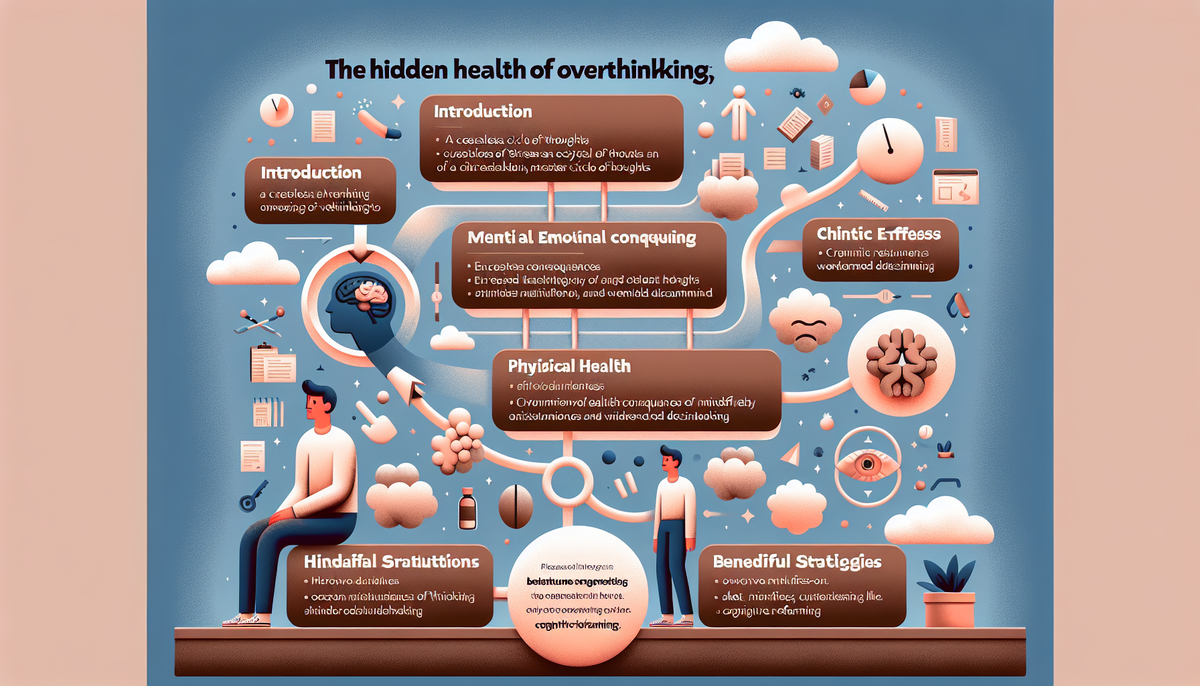The Hidden Health Effects of Overthinking

What is Overthinking?
Overthinking is more than just thoughtful consideration; it's a relentless cycle of dwelling on the same thoughts, which are often distressing or unproductive. Unlike effective problem-solving, which moves toward a solution, overthinking involves replaying past events, second-guessing decisions, and worrying about a future that hasn't happened. This pattern, also known as rumination, can trap you in a loop of negativity, making it difficult to escape your own mind and engage with the world around you. Recognizing this distinction is the first step toward addressing its hidden effects on your health.
The Psychological Toll of Overthinking
While often dismissed as a harmless habit, chronic overthinking exacts a significant toll on your mental and emotional well-being. It can amplify negative feelings, distort your perception of reality, and leave you feeling mentally exhausted and emotionally drained.
Increased Anxiety and Stress
Overthinking is a primary driver of anxiety and stress. By constantly focusing on potential threats and worst-case scenarios, your mind convinces your body that it is in a perpetual state of danger. This triggers the fight-or-flight response, flooding your system with stress hormones like cortisol. Over time, this sustained state of high alert leads to chronic anxiety, making it difficult to relax and find peace. The cycle is vicious; anxiety fuels more overthinking, which in turn deepens the anxiety.
Impaired Decision-Making
One of the most counterintuitive effects of overthinking is its negative impact on decision-making. The phenomenon known as "analysis paralysis" occurs when you over-analyze a situation to the point that you become incapable of making a choice. The fear of making the wrong decision, coupled with an endless evaluation of pros and cons, leads to inaction. This inability to act can result in missed opportunities and a growing sense of frustration and self-doubt, further reinforcing the belief that you are incapable of making good choices.
The Physical Health Consequences
The impact of overthinking extends beyond your mind, manifesting in tangible and often serious physical health problems. The chronic stress it generates can disrupt nearly every system in your body, leading to a cascade of negative effects that can diminish your quality of life.
Chronic Fatigue and Sleep Disturbances
A mind that won’t turn off is one of the biggest obstacles to restful sleep. Overthinkers often find themselves lying awake for hours, their thoughts racing from one worry to another. This leads to sleep deprivation and poor-quality sleep, resulting in chronic fatigue. The lack of restorative sleep not only leaves you feeling physically and mentally exhausted but also impairs cognitive function, making the tendency to overthink even worse the next day.
Weakened Immune System
The persistent release of cortisol caused by chronic stress has a direct and detrimental effect on your immune system. High cortisol levels can suppress the effectiveness of your immune defenses, leaving you more vulnerable to infections, from the common cold to more serious illnesses. Over time, this constant assault on your immune function can contribute to a state of chronic inflammation, which is a known factor in a wide range of diseases.
How to Break the Cycle of Overthinking
Breaking free from the grip of overthinking requires conscious effort and consistent practice. By implementing targeted strategies, you can retrain your brain to foster healthier thought patterns and reclaim control over your mental and physical health.
Mindfulness and Grounding Techniques
Mindfulness is the practice of bringing your attention to the present moment without judgment. Techniques such as meditation, deep breathing exercises, and sensory grounding (e.g., focusing on five things you can see, four you can touch, etc.) are powerful tools for interrupting the cycle of rumination. These practices help anchor your mind, pulling your focus away from past regrets and future worries and into the reality of the now. Regular practice can reduce stress and create the mental space needed to think more clearly.
Cognitive Reframing
Cognitive reframing is a technique used in cognitive-behavioral therapy (CBT) that involves identifying, challenging, and changing negative or irrational thought patterns. When you find yourself overthinking, take a step back and question the validity of your worries. Ask yourself: Is this thought productive? Is there a more positive or realistic way to view this situation? By consciously replacing negative assumptions with more balanced and constructive ones, you can systematically dismantle the mental habits that fuel overthinking.
Conclusion
The hidden health effects of overthinking are profound, impacting everything from your mental clarity to your physical resilience. This cycle of rumination is not just a quirky personality trait but a significant risk factor for anxiety, stress, sleep deprivation, and a weakened immune system. However, you are not powerless against it. By embracing practices like mindfulness and learning to reframe your thoughts, you can break the cycle. Reclaiming your well-being starts with the decision to manage your mind, rather than letting it manage you. Take the first step today toward a healthier, more peaceful life.




